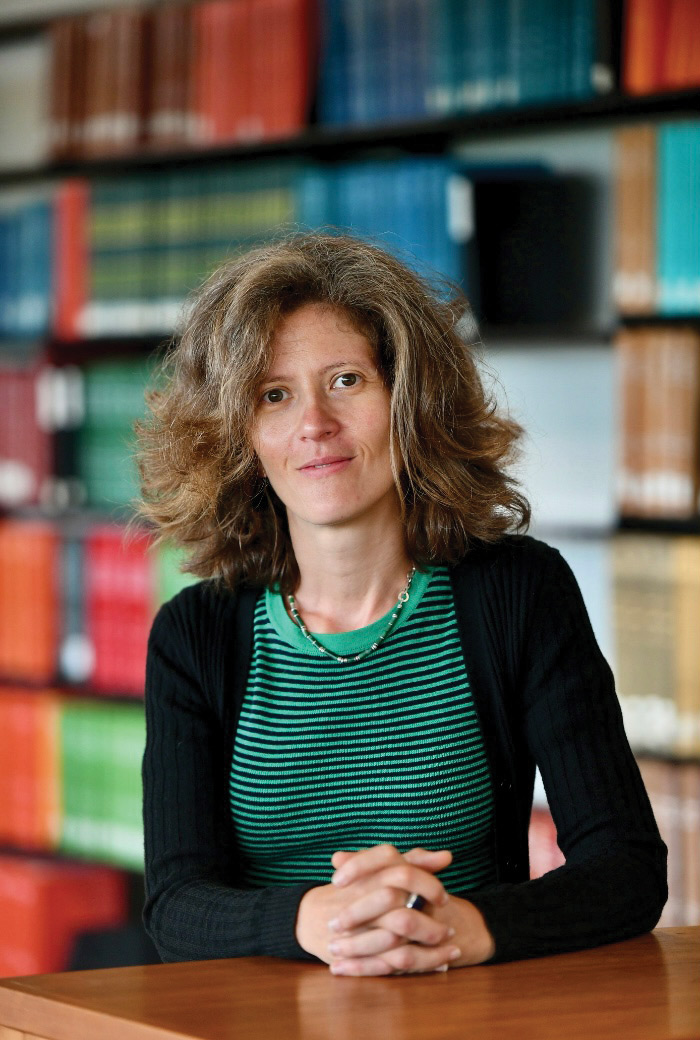Faculty | Highlights
FACULTY
New Professors to Challenge Students With Intriguing Legal Issues, New Ideas
Brooklyn Law School extended a warm welcome to a slate of new professors whose scholarship and legal experience promise to bring fresh ideas and viewpoints on such varied topics as the language used in criminal cases, critical race theory, and the gig economy. In addition to their scholarship and experience, they shared their favorite Brooklyn experiences (so far).

Professor Anna Roberts joined Brooklyn Law School this year after serving as a visiting professor during the last academic year.
Anna Roberts, formerly a visiting professor at Brooklyn Law School, has joined the tenured faculty as Professor of Law, and is teaching Evidence, Criminal Law and Procedure (including contemporary issues), and Torts.
“Among the many reasons why I was thrilled to accept the offer were the students and the faculty,” Roberts said. “Visiting allowed me to meet a large group of students in my Evidence class, and the discussions that we had in that course were among the best that I have had in my teaching career. The faculty is mighty across the board and, in the areas on which I focus, includes scholars that have influenced me as much as anyone in the field.”
Roberts previously taught at St. John’s University School of Law and Seattle University School of Law. Her scholarship focuses on aspects of trial procedure, including peremptory challenges, prior conviction impeachment, jury disqualification, and jury decision making, often focusing on assumptions and stereotypes surrounding the criminal system. She also worked as a public defender with the Neighborhood Defender Service of Harlem and as a law clerk for Hon. Constance Baker Motley in the U.S. District Court for the Southern District of New York.
“I have had the chance to study convictions in two settings: I have seen them being imposed in court as a public defender and I have seen them being described in legal documents, whether judicial decisions, legislative discussions, or legal scholarship,” Roberts said. “It is the gap between those two vantage points that inspires much of my scholarship: I question the use of convictions to exclude, punish, stigmatize, stereotype, and label through my highlighting of aspects of the process used to produce them. I also write about ways in which our legal language attempts to bridge that gap by implicitly portraying convictions as necessary and reliable. I have started focusing on the use of language in my Criminal Law class, asking students to look closely for legal terms that do that sort of work.”
Brooklyn favorites: “There are two favorite days in my Brooklyn calendar. One is the Brooklyn Pride Parade, which goes right past our home. The other is Atlantic Antic (every October), in which one can revel in the diversity of businesses, performers, and residents of Atlantic Avenue and this borough.”
“Among the many reasons why I was thrilled to accept the offer were the students and the faculty,” Roberts said. “Visiting allowed me to meet a large group of students in my Evidence class, and the discussions that we had in that course were among the best that I have had in my teaching career. The faculty is mighty across the board and, in the areas on which I focus, includes scholars that have influenced me as much as anyone in the field.”
Roberts previously taught at St. John’s University School of Law and Seattle University School of Law. Her scholarship focuses on aspects of trial procedure, including peremptory challenges, prior conviction impeachment, jury disqualification, and jury decision making, often focusing on assumptions and stereotypes surrounding the criminal system. She also worked as a public defender with the Neighborhood Defender Service of Harlem and as a law clerk for Hon. Constance Baker Motley in the U.S. District Court for the Southern District of New York.
“I have had the chance to study convictions in two settings: I have seen them being imposed in court as a public defender and I have seen them being described in legal documents, whether judicial decisions, legislative discussions, or legal scholarship,” Roberts said. “It is the gap between those two vantage points that inspires much of my scholarship: I question the use of convictions to exclude, punish, stigmatize, stereotype, and label through my highlighting of aspects of the process used to produce them. I also write about ways in which our legal language attempts to bridge that gap by implicitly portraying convictions as necessary and reliable. I have started focusing on the use of language in my Criminal Law class, asking students to look closely for legal terms that do that sort of work.”
Brooklyn favorites: “There are two favorite days in my Brooklyn calendar. One is the Brooklyn Pride Parade, which goes right past our home. The other is Atlantic Antic (every October), in which one can revel in the diversity of businesses, performers, and residents of Atlantic Avenue and this borough.”